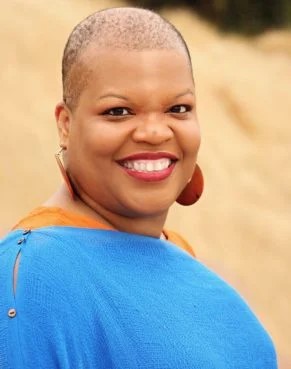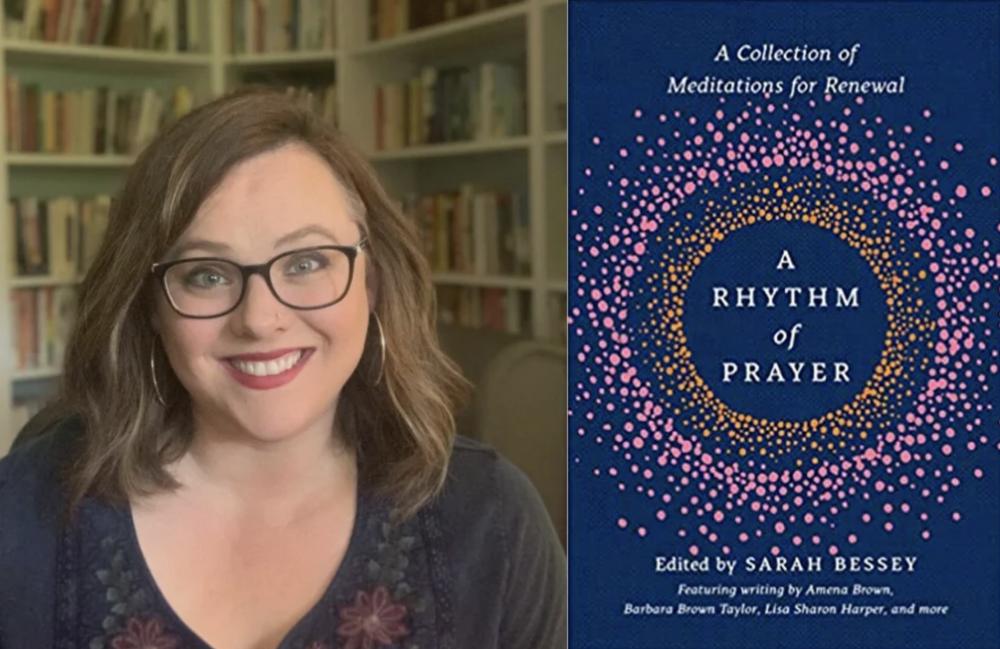(RNS) — A bestselling book on prayer has some Christians upset and calling on Target stores to remove it from their shelves.
A Rhythm of Prayer: A Collection of Meditations for Renewal” — edited by progressive Christian author Sarah Bessey — features a number of different types of prayers written by theologians, pastors and authors from various Christian traditions. It hit bestseller lists in both the United States and Canada when it was released in February.
The prayers in the book include a benediction by Bessey, a poem by Potawatomi Christian author and speaker Kaitlin Curtice, a prayer based on a chicken soup recipe by pastor and peacemaker Osheta Moore, “A Liturgy for Disability” by author and disability advocate Stephanie Tait and even blank pages for those times when it feels like there aren’t words.
More on Broadview:
- What to do with your grief when a church closes
- The non-religious chaplain helping university students
- 7 lessons for a more spiritual relationship with your garden
But it’s the “Prayer of a Weary Black Woman” by clinical psychologist and womanist theologian Chanequa Walker-Barnes that has caught the attention of Fox News and conservative Christians on Twitter, some tweeting at Target to remove the book from its stores.
One line from the prayer in particular has caused the backlash, which reads: “Dear God, Please help me to hate White people.”
Bessey and other contributors to “A Rhythm of Prayer” responded to what they said has been a “firestorm of harassment, criticism, coordinated attacks, threats, and furor against her and the book” with a statement published Thursday evening (April 8) on Bessey’s website, saying critics are missing the point of the prayer.
“Dr. Walker-Barnes’ prayer is faithful, honest lament, modelled on Scripture. It is a gift of intimacy and vulnerability to the Church and we are grateful to her, not only the prayer, but for her work and her witness in the world,” the statement reads.
“The backlash that Dr. Walker-Barnes is facing because of her prayer ironically serves as proof of why such a prophetic, powerful, and potent prayer is necessary.”
The controversy seems to have started — as most controversies do these days — with a tweet.
Over the weekend, a Virginia pastor posted a photo of the first page of Walker-Barnes’ prayer that he said was sent to him by a member of his church who spotted the book at Target. The controversial first line of the prayer was underlined.

In a follow-up tweet, Ryan McAllister, an elder and lead pastor at Life Community Church in Alexandria, Virginia, added, “This kind of thinking is a direct result of CRT and is completely anti-biblical.”
CRT, or critical race theory, is an academic theory examining systemic racism.
The theory has become a lightning rod since the Southern Baptist Convention’s Council of Seminary Presidents issued a statement in November declaring it incompatible with the denomination’s statement of faith. The statement did not define critical race theory or explain how it clashes with the core beliefs of Southern Baptists, and several prominent Black Southern Baptists since have announced their departures from the largest Protestant denomination in the U.S.
Conservative writer Rod Dreher described the prayer as racist and blasphemous Thursday in a blog post.
“What Walker-Barnes and her progressive Christian allies represent is, let’s be clear, the spirit of Antichrist. It is blasphemous to call on God to make you hate people at all, much less on the basis of race,” Dreher wrote.
The statement from contributors to “A Rhythm of Prayer” pointed out Walker-Barnes’ prayer is modeled on biblical Psalms of lament and anger, called imprecatory Psalms.
“Prayers in Scripture often reflect a similar arc of anger and exhaustion and longing that turns the petitioner right back to trust in God’s goodness, hope, and call to love, just as Dr. Walker-Barnes modelled so well,” it reads.
Walker-Barnes tweeted, “Being a professor, I can tell when people haven’t done or understood the reading.”
The author explained on social media that she had written “Prayer of a Weary Black Woman” after a white person she had considered a friend used the “N-word” in casual conversation with her.
“I took my rage to God in prayer. I owned it. I was truthful to God about what I was struggling with. And I prayed for God not to let anger and hatred overwhelm me,” Walker-Barnes tweeted.
While her own personal experiences and her family history — her grandfather fled sharecropping in South Carolina — have given her reason to hate white people, she tweeted, God has given her “a different spirit, one that insists on looking for goodness and possibility, one that holds anger and hope together.”
In the prayer, Walker-Barnes begins by asking God to help her “at least want to hate” white people, to stop her from “striving to see the best in people,” to be “able to walk away from them and their sinfulness without trying to call them to repentance.” But, she continues, “You have kept my love and my hope steadfast even when they have trampled on it.”
The prayer ends: “Thus, in the spirits of Fannie and Ida and Pauli and Ella and Septima and Coretta, I pray and I press on, in love.”


Comments
Gary says:
God is sovereign, but the earth is Satan’s domain. God in His wisdom has allowed Satan to rule the world (John 12:31; 2 Corinthians 4:4)
Unfortunately we as Christians have to live in this world to shed light onto it until God calls us home. However making an uprising over every little thing that goes against our beliefs, I don’t think, is conducive to our witness. Telling (I wanted to say “Targeting”) a store influenced by worldly powers to stop selling a book is a waste of air. I hate to say this, but if you don’t like the book, don’t buy it.
Critics (I’m assuming Christians) would be better off in Sunday Schools or behind the pulpit to explain why Christians shouldn’t read a particular book (and not dwell on the issue). Publically condemning this book has done one thing, it has popularized the book. Personally I wouldn’t read it because I dislike these types of books, they’re usually not edifying.
Walker-Barnes has deliberately created an issue. If I had written a poem starting with “Dear Lord, help me to hate black people,” It would not have made it past the publishers, and if the world caught wind of it, I’d be as Salman Rushdie.
The poem seems to be modeled on prayer, but it is definitely against God’s Word. If it is based on the book of Job and his lamenting, we need to remember Job did not understand why he was in the position that he was in. At the end of his lament God chastises him for his critical approach (Job 38). (Here we should know better, as we have the insight of God’s purpose (Job 40) whether we like it or not (Job 42:1-6)). We also have the Spirit of God which is to be forgiving to those who hate us, never to retaliate.
If the poem is based on David’s Psalms, we would note that David never asked God to grant David vengeance on his enemies. He asked God to do the vindicating for him. (Psalms 5 and 7)
It’s one thing to rage privately before God and ask for repentance later (Job 42), but to publically print it is another matter.
Sadly this tells me she “hates” all white people. Being in North America this woman hates a lot of people. "Holding on to anger is like grasping a hot coal with the intent of throwing it at someone else; you are the one who gets burned." (Siddhartha Buddha)
Sheldon LeGrow says:
Why do many Conservative Christians think it's their duty to tell other people what to do? Why can't they live and let live? Anyway, Now I have to get on Amazon and buy the book.
Replies
Gary says:
I'm glad you said "many" and not "all". To answer your first question, it boils down to pride. "We're saved, you're not" attitude.
Your second question is harder, we are mandated in Matthew 28:19-20 to make disciples, baptize them, and finally teach them. I think "conservative" Christians sometimes get that directive backwards. We preach them, drown them, and then hope they become disciples.
Thanks for proving my post above, I hope you enjoy the read.
Replies
Sheldon LeGrow says:
We should walk a life of gratitude and humility while not intentionally doing harm to anyone, living the way that Jesus teaches and exercising love, acceptance, forgiveness and justice. Difficulty arises when pride enters the heart of some Christians who feel that, according to their tradition they feel they are "saved" and therefore feel they are somehow better than those of other faiths. So much for humility. As for evangelism; that too goes to the problem of pride. When you try to convert folks you feel your way is better than their way. That's not the case. Their way may work for them. Each of us has a mind by which he/she can make choices, think critically and make decisions that work for us. Can we not simply be happy with our personal beliefs? Religious pride has been the cause of much strife and misery. Is that what Jesus would have wanted?
Sheldon LeGrow says:
"We're saved, you're not." Not a very accepting attitude. and, I've always wondered....saved from what? If we believe we are created by God, then we are exactly the way God wants us. Or...does God make mistakes?
With Matthew 28: 19-20, that, too is a haughty attitude that sets up a "we are better than you" attitude.
I'm sure I'll enjoy the read. Thanks.
Sheldon LeGrow says:
Different people believe in God differently, that's why we have a variety of religious expressions. Prayer is the way people express their feelings, hopes, grief, and gratitude to their God. Some also pray in metaphor or other literary forms. Some shout in anger; some whisper quietly. Some, like me, say exactly what's on their mind. Some beg; some demand. I look forward to seeing the heartfelt prayers of others rather than the standard prayers in our hymnbook. Saying a prayer that is pre written is much different than a heartfelt talk with God.
Diane says:
I was initially shocked by the first line, but I consider myself logical so found the full prayer and read through it. It is powerful. I fear that I may be one of those white people she wants to hate without my even being aware. Her prayer makes me need to look at myself and my behaviour - am I vocally anti-racist but inadvertently racist? I will be studying her prayer and looking into my soul.
Sheldon LeGrow says:
My book arrived this morning (May 17). I read the first prayer. Just for the first prayer the book is worth every cent I paid. Can't wait to get at the rest.